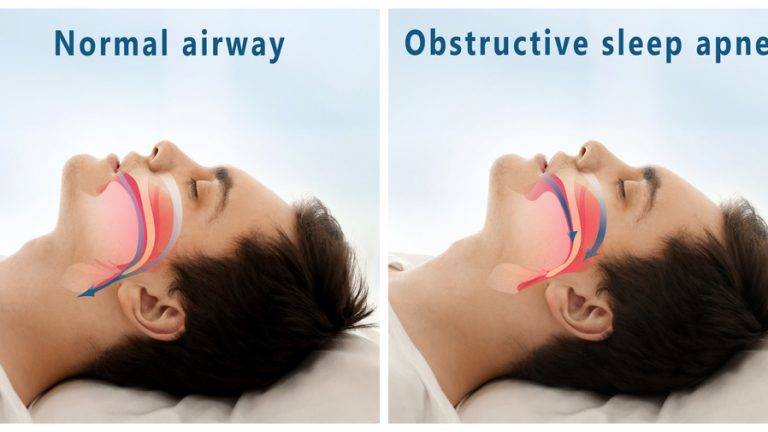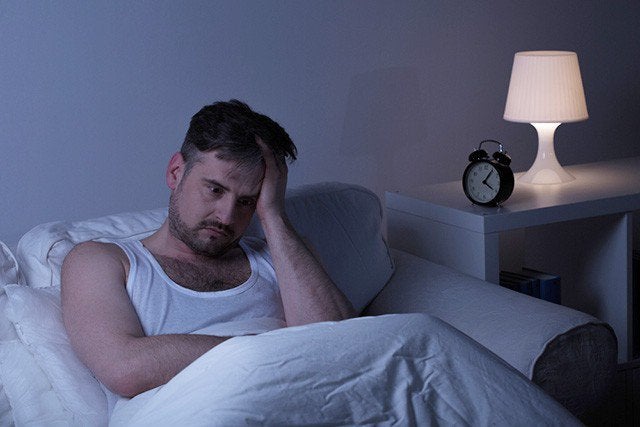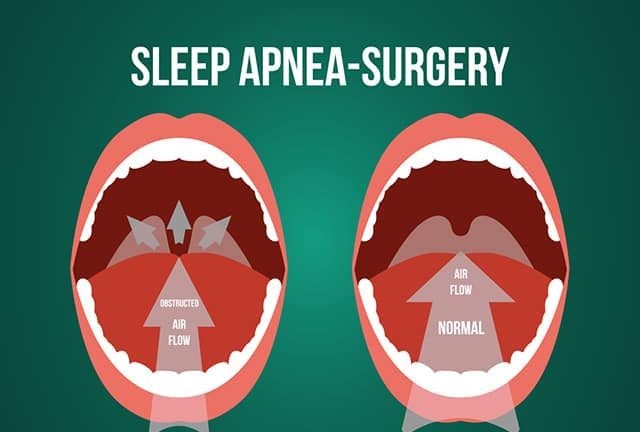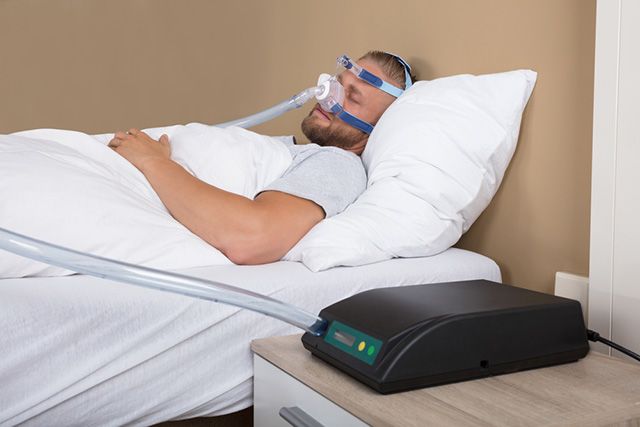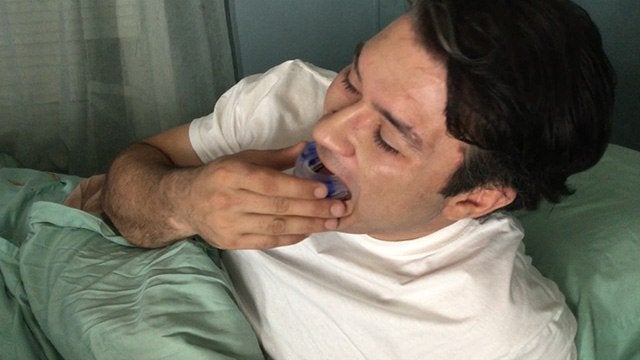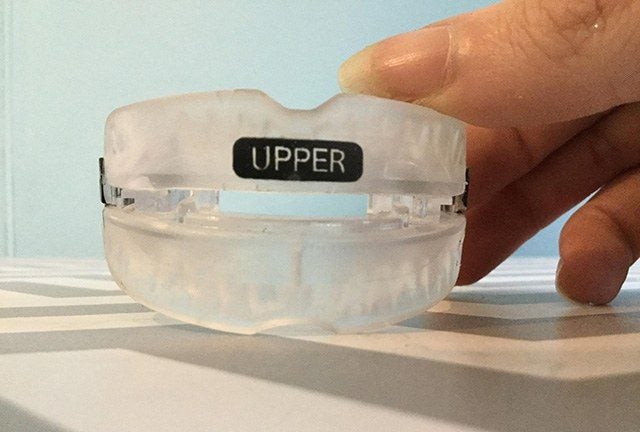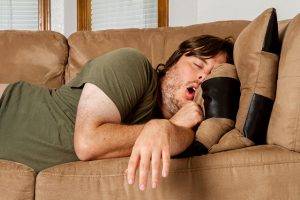
Sleep Apnea 101
In order to understand the true dangers of sleep apnea, let’s analyze what this disorder means. People who have sleep apnea experience episodes where their breathing stops for a few seconds. If you suspect that you or someone you know might suffer from sleep apnea, it’s really important to consult a doctor and find the best solution around this. With medical treatment, you can ease your symptoms and help prevent further complications.
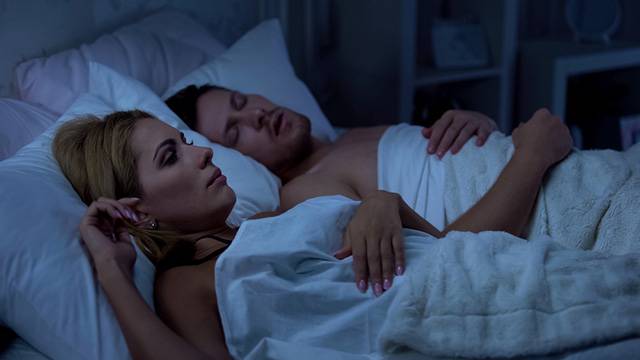
- Obstructive sleep apnea is the most common one of all. People who have it experience relaxed throat muscles.
- Central sleep apnea is triggered by the brain’s failure to signal the muscles that are in charge of breathing control.
- Complex sleep apnea syndrome is basically a combination of the above.

For a better understanding of why apnea occurs, it’s important to analyze what happens when you stop breathing. When you suffer from obstructive sleep apnea, there are muscles located in the back of your throat that start to relax. The main role of these muscles is to support a system comprised of your tongue, the throat’s sidewalls, the tonsils, the uvula, and the soft palate.
As these muscles relax, every time you take a breath, your airway narrows or closes, which basically means that you’re not getting a sufficient amount of air intake with each breath. As you don’t manage to get enough air, the oxygen levels in your blood begin to drop. This whole occurrence triggers an alarm signal in your brain and it reacts by trying to take you up so that you can breathe normally and reopen your airway. Most of the people don’t remember ever waking up because they fall right back asleep.
However, when this happens, you can also find yourself choking, snorting, or gasping. The most alarming fact is that all of this can actually occur up to 30 times within just one hour, and this will stand in the way of you reaching a deep sleep phase.
Central sleep apnea is not as common, but it can still have a major impact on your health and other aspects of your life. When this happens, your brain fails to send the right signals to your breathing muscles, so you basically make no effort to breathe for a few seconds. When that occurs, you might wake up with shortness of breath and have trouble falling back to sleep.
You may want to read: How to Mold a Mouthguard
Why Treat Sleep Apnea
While it may not seem like much, sleep apnea is a medical problem that requires immediate attention before the complications get out of hand. One of the greatest dangers of living with this problem is ending up with heart disease or elevated blood pressure. If you fail to breathe normally, the oxygen levels in your blood start to drop, which can lead to increased blood pressure. People who suffer from sleep apnea are also likelier to end up having a heart attack, stroke, or irregular heartbeats. All of these problems can be fatal.
This kind of apnea can also interrupt a person’s sleep. If that occurs on a regular basis, it messes with your sleep patterns and you might find it difficult to go back to sleep. The more sleep you lose, the more likely you are to experience fatigue during the day, which causes you to become more irritated and lose focus. There are plenty of psychological complications that could arise from being really tired during the day, including depression and high levels of anxiety.
If you have apnea, you are also prone to ending up with type 2 diabetes because this disorder can lead to insulin resistance, but also to problems like metabolic syndrome, which is a combination of hypertension, high cholesterol levels, elevated blood sugar levels, and increased waist circumference.
Sleep apnea can also pose a threat to people that have to undergo surgery that requires general anesthesia. They are more likely to develop post-surgery complications due to their breathing problems, particularly when they are still sedated.
Treating Apnea
Sleep apnea is a condition that should be diagnosed and treated as soon as possible. There are two main categories of treatment for people who suffer from sleep apnea: therapies and surgery, so let’s learn the basics of each of these.
As far therapies are concerned, sleep apnea can be treated with the help of:
- CPAP machines. Short for “continuous positive airway pressure”, CPAP treatment is useful for people who have moderate to severe sleep apnea. These machines are made of several components that work as a non-invasive form of treatment to force your air intake by using a mask that’s connected to a central control unit. CPAP machines aren’t just something that you can buy, as you need a certain medical prescription to acquire them from an authorized seller.
- Oral appliances are another way to help treat mild sleep apnea. These are easier to use and don’t usually require a medical prescription to get, but there are still things that you need to know before you buy them. Mouthguards are a good example of oral appliances used as part of sleep apnea treatment.
There are also certain medical procedures that you can undergo in order to treat sleep apnea. Some of them include:
- Removing the tissue that is located at the rear of your mouth and perhaps also removing the adenoids and tonsils as well. This surgery can help with the parts inside your mouth that vibrate and cause snoring. Normally, this procedure isn’t the most effective sleep apnea treatment and it’s definitely less efficient than a CPAP machine. It is, however, a viable solution for people who can’t get adjusted to using a CPAP machine.
- There is also the option of shrinking the tissue using radiofrequency ablation. This procedure is sometimes viable in cases of mild to moderate sleep apnea. It is a method that’s sometimes preferred over tissue removal because there is a lower chance of having surgical risks.
- Another procedure for treating sleep apnea involves the repositioning of the jaw. By moving it forward, there will be more space between the soft palate and the tongue, which reduces the chances of obstruction.
- Tracheostomy is a procedure that involves creating a new air passageway, and it’s usually a solution that specialists turn to when other forms of treatment have failed. This is a solution that can prevent death induced by sleep apnea. The procedure involves making an opening in the neck and then inserting a breathing tube inside.
A Mouth Guards Analysis
As we’ve said, mouth guards are a non-invasive form of treatment for people who suffer from apnea. It’s an oral appliance that you get to wear while you’re sleeping. It is customized to fit the shape of your mouth and comes as a rather inexpensive solution, at least when compared to a CPAP machine that’s worth hundreds of dollars.
A mouthguard is mainly used with the purpose of pushing the jaw forward to make sure that the airways are expanded and will allow air to travel. So, what are some of the perks of using a mouthguard?
- Compared to other forms of treatment, buying and using a mouth guard is actually a less expensive method of dealing with sleep apnea. A CPAP machine, for instance, can be quite expensive. But a mouthguard cost can range over a list of different factors like size, shape, materials, etc.
- Even if we’re talking about a foreign object that you have to get adjusted to and learn to sleep with every night, mouth guards are actually less intrusive. Plenty of people find it easier to get used to a mouthpiece rather than having to sleep with a mask on their face.
- A mouthguard is also friendlier from an economic point of view because it doesn’t run on electricity as a CPAP machine does.
- Because of its compact size, the mouthguard can always be with you on your travels, as plenty of the models that are available today actually come with protective cases.
- As you use a mouth guard, you are less likely to grind your teeth while you are sleeping, so if you have that problem as well, you could be killing two birds with one stone.
Of course, there are some negative aspects of using mouth guards, all of which are important to know about if you’re planning to make such a purchase yourself.
- Even if they are more comfortable than other options, mouth guards still require some getting used to. In fact, you might have to adjust to the product by using it for shorter periods of time throughout the day until you feel comfortable enough to sleep with them throughout the entire night.
- If you want your mouth guard to be the best possible fit, you should consider having one custom-made. However, this will jack up the price of the product. Alternatively, you can purchase a mouth guard that you can adjust yourself with some boiling water.
- A great risk that mouth guards pose is if you use them without being diagnosed with sleep apnea. There are, for instance, people who purchase and use these products in order to stop grinding their teeth at night, which could lead someone to have an undiagnosed case of sleep apnea. Since the mouth guard forces the airways open, you might be actually living with a problem that you don’t know you have. So a mouth guard for grinding teeth might be what you need.
You may be interested in: How to Clean a Dental Mouthguard
Getting a Custom-made Mouth Guard
If you have obstructive sleep apnea, that’s for the doctor to decide. It’s best to avoid self-diagnosing as much as possible, as only doctors can really tell the severity of your particular case, If you have a mild form of sleep apnea, a mouth guard should provide a decent solution, but if you have a more moderate or advanced state, there are other solutions that might be better for you.
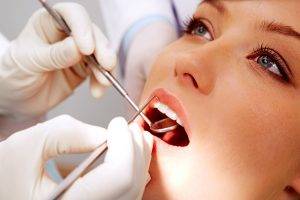
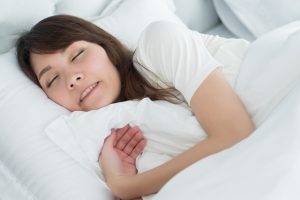
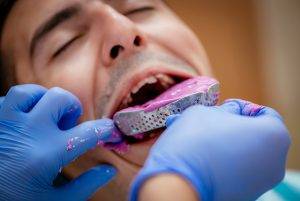
Depending on the dentist you’re seeing, they might have special equipment that takes digital impressions, this being the most accurate method out there. The mold is then processed by a dental lab that will make the mouthpiece. Fun fact: you can even use mouth guards to straighten teeth!
You may want to read: Know About Mouth Guards for Sleeping
Conclusion
A lot of people see snoring as something that’s just annoying when the truth is that it could actually be a sign of a much more serious condition. One should never rule out snoring as a potential symptom of sleep apnea, in which case a visit to the doctor should become a priority. Sleep apnea is a breathing disorder and a really serious condition that could lead to a series of other health problems, and it could even be fatal.
Mouthguards are a non-invasive type of treatment for sleep apnea, but it will only work if you don’t have a severe form of sleep apnea. If you do, then a more extensive and invasive procedure might be required. By repositioning the tongue and moving the jaw forward, a mouth guar can release your airways and allow you to breathe more comfortably, without limiting your air intake.
